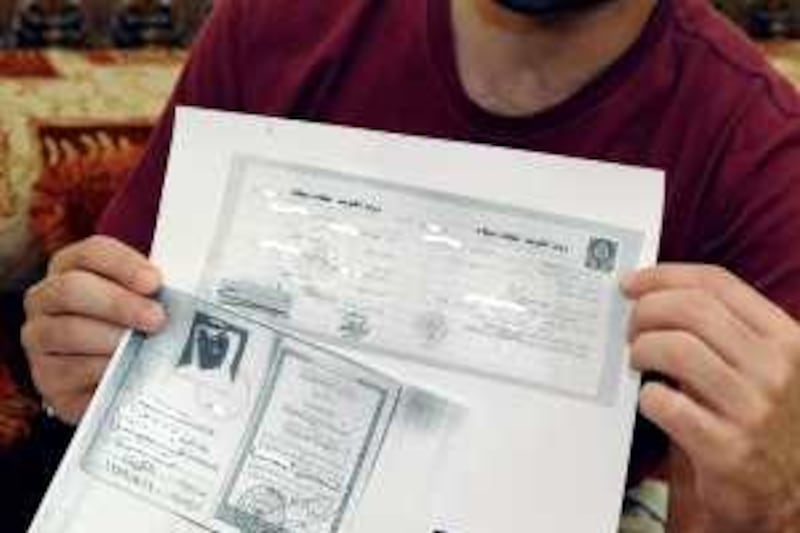KUWAIT CITY // When asked to provide his daughter's papers to get her free hospital treatment, Abdullah has a well-practised routine: he looks through his wad of documents, produces his own Kuwaiti identification, then sighs with dismay as he pretends to have forgotten the girl's. But the two-year-old girl in fact has no documents, and maybe never will. Although Abdullah, 30, is a Kuwaiti citizen and would normally pass his nationality on to his children, his daughter is the victim of a technicality that means she will never have a birth certificate, identity card, passport or any of the privileges that Kuwaiti citizens enjoy, such as free education and health care.
"Sometimes they help me, and sometimes they don't," said Abdullah, who asked not to reveal his full name. "They often think I am trying to get free treatment for the daughter of a neighbour or friend: someone who is not a Kuwaiti citizen." The children of Abdullah and an estimated 2,000 other men in Kuwait all share the same predicament because their fathers married bidoons, a minority of about 100,000 people who live in the country without nationality, many descending from people who simply did not register with the government in the state's formative years.
The country's laws allow Kuwaiti men who marry foreigners to pass citizenship to their wives and children, but because bidoons lack the appropriate paperwork themselves, nationals who marry them cannot get a marriage certificate. As a result, they cannot prove their marriages officially for naturalisation and their children cannot get birth certificates. And, because Abdullah is not a registered bidoon, the child's name cannot be put on the bidoon register, which would afford her some rights, including an official identity card, and the possibility of getting a limited passport or a driver's licence. In addition, some bidoons have government jobs and a small number are granted citizenship every year.
But Abdullah's daughter is stuck in a legal limbo where the only document she has to prove she exists is a "birth report" from the hospital where she was born. "I don't want more kids because of this problem," he said. "I didn't expect this. I thought: if I marry a bidoon, maybe I won't get the kids' allowance, but I thought I would get the wedding certificate, birth certificate and the civil ID, and my daughter would be Kuwaiti."
Most Kuwaitis receive a stipend of 50 Kuwaiti dinars (Dh635) from the government every month for each child in their family. Another father who did not want to reveal his full name, Fahad, 29, also has an alienated child. He said when he brings his 18-month-old daughter to the hospital he borrows his niece's identity card and passes his baby off as her cousin, because Kuwaiti ID cards for young children do not carry pictures.
"But I don't like this," Fahad, a conservative Kuwaiti, said. "It's not right. It's like cheating, even in our religion. "I knew about the bidoon problem before I got married, but I never thought it could affect me or my daughter or my wife - because I'm a Kuwaiti. khalas [enough]; her nationality should be the same as mine." A new organisation, the Group for the Rights of Kuwaiti Children, has started a media campaign this month to raise awareness of the small group of Kuwaitis who are affected by the legal technicality. The group's leader, Ali al Bousiri, 37, said he is lobbying MPs, pushing to have the issue debated in parliament.
An associate of the group, the lawyer Ghazi al Enezi, said he is interested in the issue because he, like everyone else in the country, believes these children "are legally Kuwaiti". He said that because of the region's patriarchal culture, their only concern is the children of male citizens. But not all Kuwaitis are convinced that the scale of the problem is large enough to get the issue on to the parliament's crowded agenda. Saadia Mufarreh, a bidoon poet and novelist, says "this is not a real problem, because only a few children suffer from it".
Ms Mufarreh believes that Kuwaitis and bidoons often work things out through negotiation. She said they often bend the rules to accommodate each other, "but in the end everybody practises life and they work things out". She said even though the rules are often not clear, many of her bidoon friends who married Kuwaitis ended up getting citizenship after a few years. A stateless citizen, who gave his name as Ahmed, said bidoons who marry Kuwaitis, have good family connections or manage to land a job in the ministry of the interior or defence, can provide a decent standard of living for their families.
He estimates around 15 per cent of his stateless colleagues are so lucky, and even of the rest, he said "most" can earn enough money in the oil-rich state to be able to employ a live-in maid from South or South East Asia. But for those who are suffering from the financial burden of their children being outside the state's generous welfare system, the solution cannot come quickly enough, and the recent attention in the media is giving them hope.
"There was nothing said about this two months ago; I thought I was virtually alone," Abdullah said. "But now, there is a lot of talk, ministers and journalists are all talking about it now." "Unfortunately we still have nothing in our hands, so we still cannot be sure," he said. @Email:jcalderwood@thenational.ae





